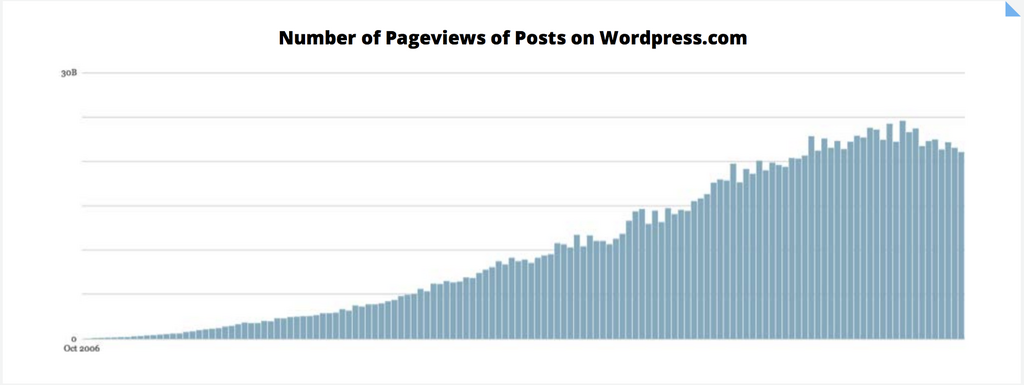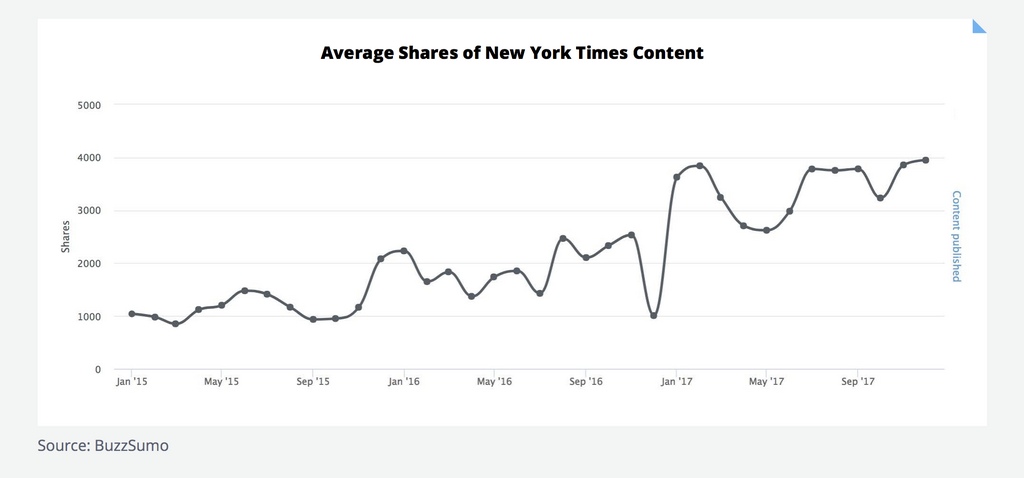The news is out: Social Shares Are Falling.
Mark Schaefer predicted early on that rising publication volumes would squeeze audience attention dry, lowering social shares whenever topics became saturated with content.
When he suggested that we gather a group at Social Media Marketing World to discuss the impact of Content Shock and the 2018 Content Trends Report, we were eager to join in.
Here’s a summary of the trends we talked about, and what we learned.
If you’d like the full Content Trends Report, download it for free.
Trend: Falling Page Views
For the first time last year, the number of page views on WordPress when down.
Mark sums up the challenge for content marketers well. “One of the best practices in our field is to see when a topic starts to be hot, then pile on with more content,” he says. “That is absolutely the wrong strategy. You’ve got to be first, and you’ve got to be original. Once the niche starts getting filled, the content isn’t going to work for you,” Mark says.
Andy Crestodina
When a topic area is saturated, look for something related, Andy suggests.
Once you have a related topic in mind, you can use Facebook to test the associated headline, leveraging the vast data in the social network to gauge interest for other platforms.
And, if you find a topic early in it’s trend trajectory, you can create content shock for others, Steve Rayson points out.
Action steps:
- Don’t create content just because everyone else is.
- Research the saturation level for content about a topic. If there’s already sea of content available, choose a narrower or related topic.
- If you find a rare unsaturated topic area, scale content quickly to create content shock for everyone else.
BuzzSumo’s Content Analysis tool can show you the saturation level for different topic areas.
Sign Up For A Free Content Analysis Trial
Trend: Falling Shares
We took a random sample of 100m posts published in 2017 (Jan to Nov) from the BuzzSumo database and compared the level of social sharing to what we found in our 2015 study.
The news is sobering, but the experts at our gathering agree about what should come next. To move forward, build community, nurture engagement, and keep your audience’s interests front and center.
Mari Smith
Mari Smith says, “For the longest time, my number one content creation tip was to ‘craft thumb-stopping content for maximum shares.’ Meaning that while Facebook users thumb through their news feed on their mobile devices, your content is compelling enough to stop users scrolling and compelling enough for users to share with their audiences.
I still stand by that tip. However, I’m shifting it to include ‘Craft your content for maximum engagement,’ given the fact Facebook is now prioritizing ‘meaningful social interaction’ in the news feed.
In addition, because Facebook Live gets six times the engagement than that of recorded videos, I’m increasing my own use of Facebook Live broadcasts and recommending the same to my clients and my students in my FAST Facebook Results Program.
Plus, Facebook has been putting significant focus on groups lately, including the “Watch Party” feature in groups, where admins or moderators can select any public video for group members to view simultaneously. The idea is to foster real time engagement, similar to Live videos.
So, the bottom line, with BuzzSumo’s significant finding that social sharing of content is 50% less effective: marketers need to focus on growing highly engaged niche communities.
Andrea Vahl
Andrea asked the question a lot of people have on their minds.
Will we get to a point where we will say that we should never post a link on Facebook? Andrea Vahl
Her conclusion is that organic posting will continue to go down, but there will always be some organic reach for brands and Pages. We’ve already seen brands winning at sharing like Burger King with their video on Net Neutrality. (We’ll wait while you go watch).
Ian Anderson Gray
The news that content is being shared less is depressing, says Ian , but it validates the view that it’s more important than ever to create really in-depth and valuable content, especially content that encourages comments and building a mini-community. As that could be too late!
Agencies and contractors who handle content marketing for clients may find decreasing shares are hard to explain to their customers.
Andrew Smith
“On the agency side, the social metrics were what we used to justify doing content,” Andrew says.
That was fine when the shares were going up. People are now conditioned to seeing reports of social shares going up. They will want to know what’s happened, and what we are going to do next.
Action steps:
- Serve your audience well by answering their questions and making information easy to find, understand and share.
- Develop a plan for communicating the value of your content with metrics other than social shares.
- Focus on building community.
- Don’t waste time with low-production value content, like simple list posts, if your topic area is already full of list posts.
Try The Facebook Analyzer For Free
Trend: Zero Inbound Links
Steve Rayson
“Getting shares is hard. Getting backlinks is very hard,” Steve says. The research shows that half of all content published in 2017 got zero inbound links.
Authoritative research and reference content are the exception. These two types of content consistently get links and shares, according to the 2018 Content Trends Report.
Another recommendation from the experts: Once an article or video is published, continue to work on getting it in front of a a wider audience. Content creators often overlook promotion, hurting their ability to get more links and shares as a result.
Ian Cleary
‘It’s very difficult to be successful with inbound marketing without outbound marketing,” Ian, of Razor Social and Outreach Plus says. “Without sufficient promotion you won’t get the links no matter how good the content is.”
Heidi Cohen
Heidi agrees.
We need to shift from from viewing each piece of content published as a once and done campaign to more extended promotion over time, she says.
And, if you’re thinking that distribution and promotion will still be a sideline to the real event of writing and publishing, Heidi points to the advice from Social Triggers’ Derek Halpern, who recommends spending 20% of your resources on content creation and 80% of your resources on distribution.
Ana Hoffman
Ana, of Traffic Generation Cafe, has a full-throttle plan for promotion. She recommends content repurposing to get and keep content in front of audiences on multiple social channels.
Here’s a cheat sheet to her process:
- Tell your story in visuals, with a slide deck, using images and short text excerpts.
- Publish the deck to SlideShare.
- Embed the SlideShare deck in posts all over the web, on LinkedIn, Medium, as a guest post, etc.
- Create a video by adding a voiceover or soundtrack to the presentation and upload to YouTube Facebook, Twitter, and Instagram.
- Save the individual slides as images for social sharing.
One implication of Content Shock is a pivot toward less low-production value content and toward more high-production value content. Ana’s strategy points the way toward dividing labor intensive posts into assets that can meet audiences on a variety of platforms.
Action steps:
- Create high-production value authoritative research and reference content.
- Promote. Promote. Promote! your content.
- Add an amplification and distribution strategy to your content plan.
- Repurpose high production value content for multiple uses.
Trend: Rush To Quality?
The New York Times, and other high authority sites, have seen increased shares, despite the overall decline.
Of course authority is important, Mark says. But, there is no institution on earth that is innovating more with their content than the NY Times. For example, consider the New York Times’ interactive graphics, or the ways they blend slides with video.
Many companies have artistic resources even greater than the New York Times. Why aren’t we seeing this move to innovate with content in business? Mark Scheafer
Megan Conley
Megan, CEO of Social Tribe, agrees about the importance of innovation.
She says that Social Tribe encourages their clients to look beyond traditional content formats (like blogs) and use interactive and other content formats to optimize content consumption.
And, she continues, “Information needs to be tailored for different audiences on different networks. In addition to being on trend, personalized and relevant, content needs to be tailored to the channel and platform you’re using. For example, people on twitter have a very short attention, span, so visual, eye-catching content (images, GIFs, short form video) get the best results.
In analyzing the New York Times’ most successful content, it’s clear that political posts drive shares. This aligns with other research into the tribal nature of sharing on social networks.
Brooke Sellas
Connecting the two ideas of community and tribal content, Brooke says, “It’s conversation that creates a tribe.” But, marketers don’t put enough emphasis on conversations.
Ultimately, conversations are the best “less is more” content, she adds.
Action step:
- Don’t let the past dictate your current content offering. If something worked two years ago, there’s no guarantee that it will work today.
- Innovate! Use every creative resource at your disposal to try new content formats.
- Use content to craft experiences for your audience.
- Don’t just share links–talk with your audience on social.
We’d love to know your plan for tackling the challenges of this year’s Content Trends!
Categories
Content MarketingCategories
Content MarketingThe Monthly Buzz⚡
Subscribe to BuzzSumo's monthly newsletter to:
Stay up-to-date with the best of the best in content marketing 📝
Get data-informed content, tips and tidbits insights first 👩🏻💻
Read top shared content by top marketing geeks 🤓
Try
Enter any topic, term or url to search to see BuzzSumo in action. It’s free!
100% free. No credit card required.














